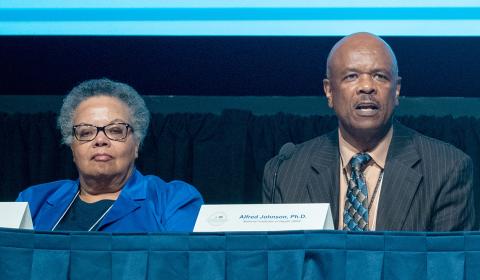Equity, Inclusion in Research
Conference Seeks Models for Increasing Participation in Underserved Communities

NIH recently sponsored a conference, “Collaborative Models for Building Equality and Equity in Research.” Attendees included representatives from several divisions of the Department of Health and Human Services (HHS), NIH institutes and centers, other federal agencies, private industry and educational organizations, including historically Black colleges and universities (HBCUs) and minority-serving institutions (MSIs).
The conference aimed to foster dialogue and collaboration among research leaders, program managers, diversity directors, industry stakeholders, advocates and policymakers. It served as a platform to discuss the barriers HBCUs and MSIs face in accessing agency programs that benefit underserved communities.
The conference also sought to facilitate these institutions’ increased participation in the medical research enterprise, thereby advancing educational equality, excellence and economic opportunities in research.
The event was organized by the NIH Path to Excellence and Innovation (PEI) 2.0 Initiative, a program designed to equip HBCUs with the resources and skills necessary to compete for NIH contracts and to effectively diversify their revenue streams.

NIH senior leadership, including Dr. Lawrence Tabak, acting NIH director; Dr. Tara Schwetz, acting principal deputy director; Dr. Alfred Johnson, deputy director for management; and Diane Frasier, head of contracting activity and director of the Office of Acquisitions and Logistics Management, offered remarks. Participants also received greetings from Kevin Anderson, secretary of Maryland’s department of commerce.
Additionally, U.S. Rep. Robin L. Kelly (D-IL) and U.S. Sen. Chris Van Hollen (D-MD) sent video messages supporting the purpose and timeliness of the conference. Rear Adm. Felicia Collins, HHS assistant secretary for minority health, reinforced the department’s commitment to advancing racial equity and support for underserved communities in medical research.
The conference featured six sessions moderated by distinguished research community members. The first session, facilitated by Roslyn Moore, deputy director of programs in HHS’s Office of Minority Health, delved into President Joe Biden’s Executive Orders on advancing racial equity.
Other sessions explored collaborative research models, sharing experiences from federal, state, local and industry levels. Breakout groups examined community engagement, workforce development, capacity building, public-private partnerships, innovation, economics and entrepreneurship, highlighting programs such as the Rapid Acceleration of Diagnostics for Underserved Populations (RADx-UP) and Morehouse Pathways.
The conference closed with synopses of posters and breakout sessions and a look at future opportunities and legislative and federal policy initiatives. Rep. Kweisi Mfume (D-MD) concluded with keynote remarks.
